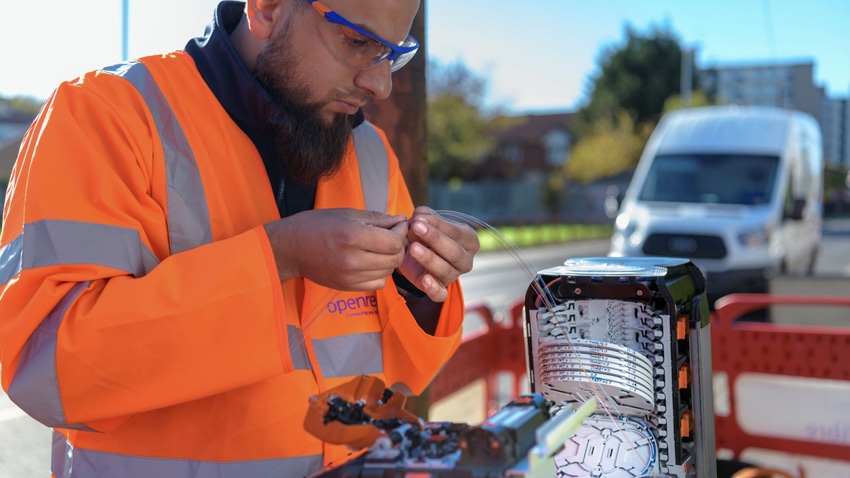Ofcom says more regulation likely coming to UK's fragmented fiber market
Ofcom kicks off the process for next review of UK's wholesale telecom market as fiber rollout continues full speed ahead, and competition between altnets heats up.

Ofcom has raised a red flag about unexpected fragmentation in the UK fiber market, saying that a "relatively small" number of altnets (alternative network providers) account for most of the build and that most infrastructure still remains unused.
The remarks were this week included in a document that will inform Ofcom's approach to regulating the UK's wholesale telecom market in the coming years.
The UK's fiber rollout has been faster than expected, with some arguing this has been at least partly thanks to the flurry of activity from altnets. However, Ofcom remarked that the market has become unexpectedly fragmented, "with there likely to be over 100 altnets deploying fiber networks in the UK." Just a few players are responsible for most of the fiber deployment, it added.
Consolidation may be only a matter of time, and companies are already jostling for position. CityFibre – the UK's biggest altnet – acquired its smaller competitor Lit Fibre earlier this month, adding what will eventually be 300,000 premises to its network while saying it hopes other, similar deals will follow. Virgin Media O2, meanwhile, unveiled plans in February to launch a new fixed-line "NetCo," in part to serve as a platform for potential consolidation.
Echoing the opinion consolidation is coming, Ofcom said that there is a possibility that new, consolidated providers could become stronger competitors. As a result, the regulator plans to "not only consider the presence of rival networks to Openreach but, importantly, the level of competitive constraint they place on Openreach and their ability to compete sustainably."
Full speed ahead
Altnets' involvement has spurred the buildout of high-speed networks. While Ofcom was originally expecting 80% of the country to have gigabit-capable connections by 2026, this figure currently stands at 78% – or 23.2 million homes. By January 2026 it now predicts a 90% level of coverage, up from 40% in 2021.
Meanwhile, 57% of UK homes can request a full-fiber connection. Ofcom expects this percentage to grow significantly and surpass 80% by 2026. Its data shows, however, that the average connection rate for the country stood at 28% in May 2023, with large variations between different providers – ranging from less than 10% to more than 30%. Nokia, one of the world's biggest vendors of fiber network products, considers 30% as the threshold for achieving long-term payback.
Because of the increased speed of network buildout, the regulator expects there will be less activity after 2026. As a result, its key focus will be on promoting sustainable network competition.
Ofcom acknowledged it takes time for competitors to become established and overcome the "incumbency advantages of Openreach," but at the same time reckoned there is a need to avoid a situation where costs borne by consumers are not offset by long-term benefits.
It stressed the future need for a stable regulatory environment, seeing this as key to fostering investment in network infrastructure. And its priorities are unchanged since 2021, according to the latest document, which means incentivizing investment and promoting network competition.
Altnet woes
Ofcom's main task seems to be continuing a balancing act where Openreach, as the owner of the largest fixed network, is able to continue building fiber – especially in areas where network competition isn't viable – but not so dominant as to make sustainable competition an impossibility.
Unsurprisingly, Ofcom is struggling to keep all parties happy. Altnets have, in particular, been up in arms over last year's approval of Openreach's Equinox 2 pricing plan, which cuts wholesale charges for companies using its network.
Ofcom said it had found "no evidence" that Openreach has rolled out fiber to target or harm competitors, or that its build decisions weren't commercially rational, adding that it continues to monitor the situation. That would appear to contrast with opinions voiced by altnets in the past.
Last year, the Independent Networks Cooperative Association (INCA) – an organization representing alternative networks in the UK – called on the government to address what it calls market failures in broadband. It argued that Openreach was overbuilding altnets in areas where two networks weren't commercially viable.
But Ofcom insisted it has taken action against Openreach in another area, in order to improve competitors' access to the incumbent's ducts and poles.
Ofcom's last policy document setting out its strategy for regulating wholesale telecom networks was published in 2021 and is valid for a period of five years, however the regulator has an obligation to conduct and publish a review in 2026.
The document published this week kicks off this regulatory marathon, with a consultation expected to launch next year. The process will culminate with the launch of the final Telecoms Access Review in 2026.
Read more about:
EuropeAbout the Author(s)
You May Also Like




_International_Software_Products.jpeg?width=300&auto=webp&quality=80&disable=upscale)







